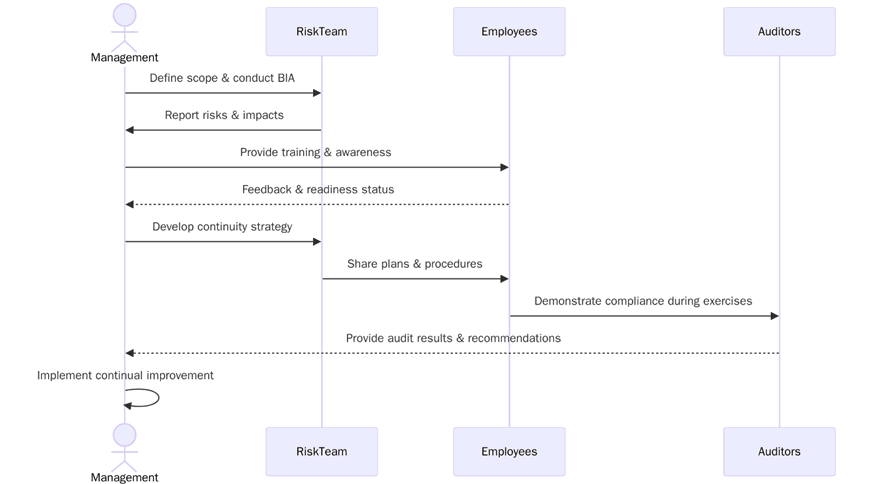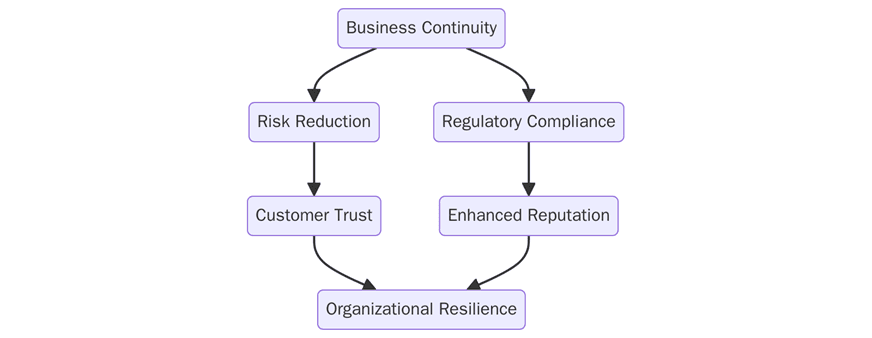ISO 22301:2019 – Building Business Continuity & Resilience into Your Operations

Introduction to ISO 22301:2019
Disruptive events can occur to businesses of any kind and size, and for any number of reasons (natural disasters, cyber incidents, supply chain failures, health crises, etc.). Reliability and trust are significant to an institution and for organisations such as data centres, manufacturers, banks, healthcare institutions or public services, disruption can be very damaging - not only lost revenue, but damaged reputation. Customers and stakeholders expect a reliable institution to be committed to providing services free from interruption, to safeguarding critical data and to have well-tested, reliable return to operations plans in place.
ISO 22301:2019 offers organisations a way to plan and prepare for unpredictable events, manage risk and maintain service delivery and continuity. ISO 22301 lays out the framework for organisations to establish, implement, maintain and improve a Business Continuity Management System (BCMS). Obtaining certification is an indication to clients, regulators and other organisations that you are prepared to manage crises or disruptive events while continuing to provide services.
Speak to an auditor at Pacific Certifications, 15-minute call to scope your certification pathway!
Quick summary
ISO 22301:2019 assists organisations in preparing, responding, and recovering from disruptions through a business continuity structure. It provides the framework to ensure that important services are available in an incident, and recovery is structured and can be measured.
Introduction
Business continuity has moved from optional to requirement. Institutions working in high-risk environments like law enforcement and emergency services have witnessed global crises, cyber incidents and operational failures, in which disruption can spread quickly across industries and borders. ISO 22301:2019 provides formalisation of continuity planning, risk assessment and tested recovery plans. This standard requires leadership engagement, regular internal audits and established response protocols. Most importantly, it relies on demonstrable outcomes, so institutions can show proof of their resilience by having documented tests and monitoring. ISO 22301 moves institutions from a reactive stance to a systematic system focused on maintaining trustability within the organisation, even when faced with surprises.
Why ISO 22301:2019 certification is important?
ISO 22301 certification carries a lot of importance, as it empowers an institution to assure that they can continue to deliver critical operations during times of crisis. Clients, regulators, and partners expect services to be reliable, even in times of pressure. Certification reassures clients that risks have been identified, controls have been tested and the recovery procedures are available.
In addition, certification helps to meet compliance requirements with multiple regulations and international supply lines. Many industries (especially finance and IT services) require suppliers and partners to have ISO 22301 certification. This pledges not only resilience for an institution but also opens doors for the institution for global business and long-term trust.
What are the requirements for ISO 22301:2019 certification?
ISO 22301:2019 outlines defined requirements to ensure resilience is integrated to the day-to-day operational activities. Organisations would be required to implement systems that documented risks, procedures and measures for smoothly recovering their operations. Below are a few requirements to consider:

1. Establish the scope of the business continuity management system, inclusive of critical functions and services.
2. Establish organisational policy for continuity, crisis management and recovery.
3. Conduct a risk assessments and business impact analysis to identify predictors to risk.
4. Document and communicate system if procedures to follow for crisis communications, backup or transitioning to recovery services.
5. Provide evidenced records such as logs of incidents, recovery exercises or monitoring of service level agreements (SLA).
6. Ensure to train staff and volunteers on their roles as continuity supporters.
7. Implement procedural controls for example redundancy, disaster recovery sites or supplier SLA’s, etc.
8. Conduct internal audits to assess organisational readiness in the event of continuity activations.
9. Lead organisational metrics reviews, to assess risks, objectives and performance metrics.
10. Ensure nonconformities are addressed quickly and corrective action is taken.
11. Commit to continual improvement by advancing recovery procedures and controls.
ISO 22301:2019 Certification audit
The certification audit ensures that an institution has established a reliable business continuity framework. The process includes:
Stage 1: Audit reviewing documentation such as risk assessments, continuity plans and recovery drill results.
Stage 2: Audit verifying implementation across departments and facilities, including testing of recovery systems.
Nonconformities: It must be corrected with evidence of improvement.
Management review: It ensures leadership commitment to resilience and oversight of continuity processes.
Final certification: It is issued after compliance is confirmed.
Surveillance audits: They are carried out yearly to verify ongoing compliance.
Recertification audits: They take place every three years.
What are the benefits of ISO 22301:2019 certification?
ISO 22301:2019 certification provides institutions with assurance that they can withstand crises and continue delivering services. It protects revenue, reputation, and client relationships by minimising downtime. Many institutions also measure success through KPIs such as incident resolution times, audit closure periods, recovery testing frequency and SLA compliance rates with suppliers. The main benefits include:

Greater trust from clients and regulators due to independent verification of resilience
Improved risk management through tested continuity and recovery controls
Reduced downtime with clear procedures and redundancies in place
Compliance with regulations and international supply chain requirements
Competitive advantage in contracts where resilience is mandatory
Employee readiness through training and regular continuity drills
Long-term stability supported by measurable KPIs and continual improvement
Recent trends in ISO 22301:2019 adoption
In the recent years, ISO 22301:2019 is gaining importance as organisations experience mounting risks from climate events, cyber events and disruptions to the supply chain. Clients increasingly seek proof of continuity planning in advance of executing contracts making certification more of a business necessity than an option.
Another trend we are seeing is a request for Service Level Agreements (SLA's) with critical suppliers and outsourcing partners attesting to the continuity expectations. Organisations are monitoring Recovery Time Objectives (RTO), Recovery Point Objectives (RPO) and communication response times to show resilience in real terms. This reflects a growing trend whereby organisations are increasingly looking at ISO certification for not only compliance but also articulating and building measurable resilience across their business.
Contact us
Pacific Certifications provides accredited ISO 22301:2019 certification services for institutions in all sectors. Our audits help institutions strengthen resilience, protect critical functions, and maintain trust with clients, regulators and partners.
If you need support with ISO certification ISO 22301:2019, contact us at [email protected].
Author: Alina Ansari
Read More at: Blogs by Pacific Certifications

